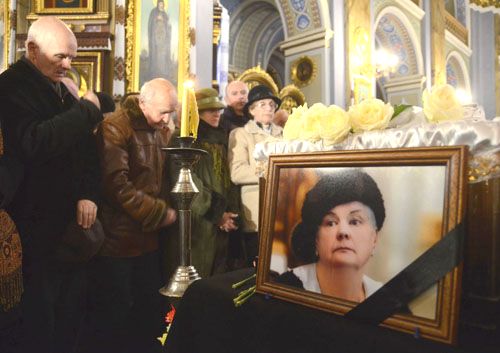“We have only warm memories of her”
Lesia Gongadze was buried on December 2
Lesia Gongadze, mother of journalist Heorhii Gongadze who disappeared 14 years ago in 2000, was buried on December 2. About two hundred people, including relatives, writers, journalists, and government officials came to the memorial service held at the Church of the Transfiguration. Gongadze, who died on November 30 aged 68 after a serious illness, was buried on Briukhovychi Cemetery on Lviv’s outskirts near her parents.
Her daughter-in-law Myroslava Gongadze wrote on her Facebook page: “My favorite Ukrainian poet Lesia Ukrainka wrote: ‘No, I’m alive! I’ll live eternally! I have that in my heart which cannot die!’ Her namesake, mother of Heorhii Gongadze, died in the early hours of November 30. She departed this life quietly. Few people knew about her illness. She rebuffed all help, avoided even a hint of weakness and refused treatment. Perhaps, she wanted to finally be reunited with her son there in heaven where life is eternal. Her last words, spoken to me by phone on evening of November 27 were: ‘Do not worry for me, take care of children.’
“Her son said the same words to me a month before his death. ‘Take care of the children,’ he said in August 2000. I was really surprised then, unable to decipher what he meant and had in mind. Perhaps, he, too, felt his end approaching...
“Having raised her son a healthy man, despite him being seen as unlikely to survive by doctors as he weighed just one and a half kilogram when born, she saved dozens of other children. Babies with cerebral palsy began walking in her care. She had miraculous hands and a talent from God. She went to Him forever in the early hours of November 30.
“Now both she and her only son are watching us from heaven, while our duty is to take care of our children and their future here on earth. Many of them are on the squares today, fighting for their right to live with dignity. We have raised a worthy generation, but our task is to build a foundation enabling them to build this country further.
“Let memory of Lesia Korchak [maiden name of Lesia Gongadze. – Ed.], who raised a Hero of Ukraine, live forever. You will live in our hearts, while I as well as probably whole Ukraine will be forever indebted to you.”
Ostap DROZDOV, creator and host of the political program “In Plain Words” broadcast by the ZIK TV channel:
“Gongadze participated in my program three times. The last time was exactly one year ago. When I invited her by phone, she replied jokingly: ‘My dear boy, I am sick and looking definitely unwell. What use can be of an ugly old woman for your program?’ Then, half an hour later, she phoned back and said she was coming. She looked perfectly, wearing black hat and wide shawl, with her lively eyes big and moist as always. I know perfectly well what people said about her behind her back and how much she suffered from it. I visited her at her home, a tiny room in a shared apartment in an old house in Stefanyka Street, like two years ago. She told me then how people stopped her on the street and rudely said: ‘Stop it at last! Bury him already and get over it!’ She wept and said often: ‘Our people are monsters.’ She added that tuberculosis and AIDS patients whom she nursed in the hospital were much kinder and more sincere. Quite a few people asked me: ‘Why do you invite her at all? You could not fail to see that she is... well, you know what I mean, do not you?’ Still, she loved even monsters. When I was at her house, she pulled out of a box a certificate saying that she had no record with the city psychiatric facility. She said: ‘I had to get this certificate.’ I felt ashamed.
“Her death will close her son’s case. She was the last obstacle on the way of killing it for good. When departing this world, she did not see it as reuniting with her son, for she was convinced right up to her last breath that he was alive. She saw people ‘dancing on the bones’ of her son throughout this decade. She called it so, too. I learned once that some city renamed an avenue to honor Heorhii Gongadze, and phoned Lesia Gongadze to comfort her. Surprisingly, she was calm, saying just: ‘Well, how could they do it? My son is not even buried. There is no tomb. The case is open. Still, they rename a street, thus burying him alive.’
“She participated in a program covering our youth’s problems in 2012, and expressed her outrage at people knowingly dumbing down our children and limiting their horizons. She even used a poetic metaphor: ‘A rose watered with blue paint will take a blue color.’ Ironically, Gongadze’s heart stopped in the same night that the Berkut riot police trampled our youth. Perhaps, the terrible screams of young boys and girls reached all the way to a tiny room in Stefanyka Street in Lviv, laden with childhood and youth photos of Heorhii Gongadze.
“I firmly believe that Lesia Gongadze was very calm when she took her last breath, for she had the good fortune to see in her last week that wonderful, beautiful, bright young generation, watered with every paint to no avail. She was lucky to be still alive at this historic moment, witnessing the emergence of the generation who are a hundred times better than us. So, everything she went through was not in vain. We have only warm memories of her.”






